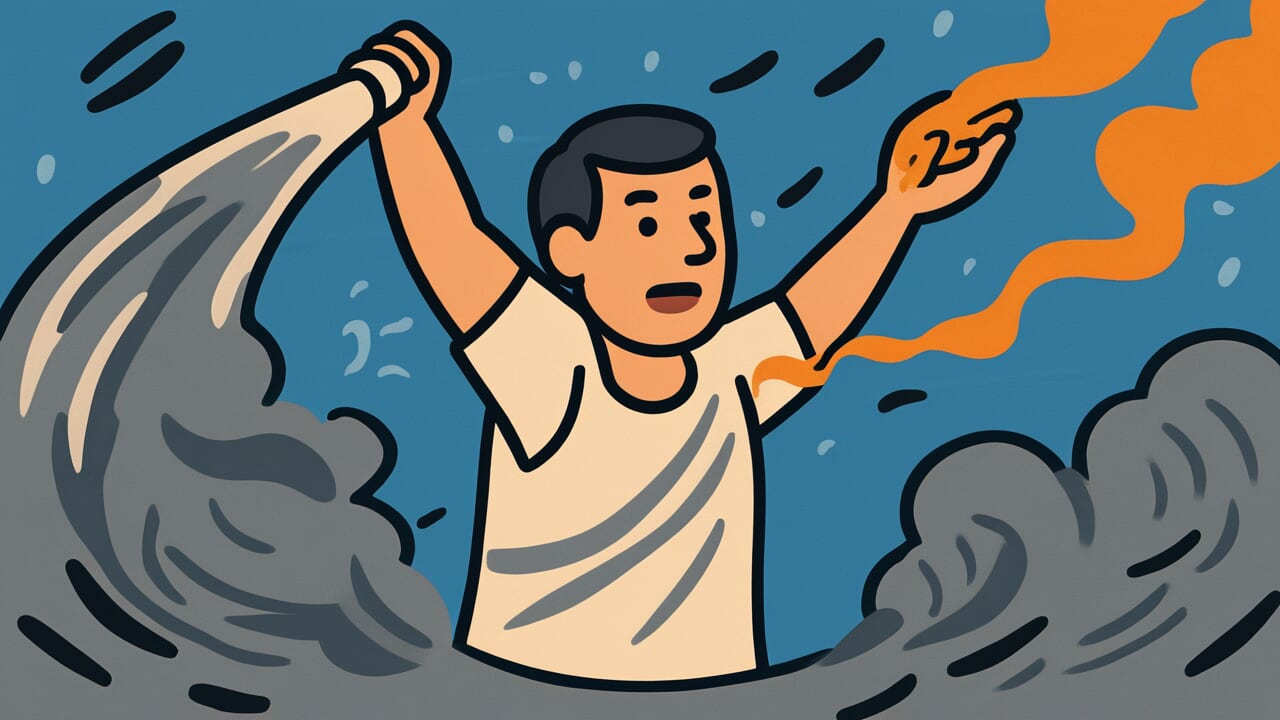How to Read “Scattering ashes in a strong wind”
Ōkaze ni hai wo maku
Meaning of “Scattering ashes in a strong wind”
“Scattering ashes in a strong wind” is a proverb that warns us about acting without carefully reading the situation around us. When we ignore circumstances, our actions can backfire and harm us instead.
If you scatter ashes when a strong wind is blowing, the ashes will fly back and cover you. This vivid image teaches us the foolishness of moving forward without considering timing and conditions.
This proverb is especially used as a warning for people who try to act according to their own wishes during unstable or chaotic times. Even actions that would normally be fine can backfire when timing or circumstances are wrong.
In modern life, this applies to many situations. Making risky investments when markets are turbulent, or forcing through reforms when an organization is in chaos, are perfect examples.
This proverb offers practical wisdom about the importance of reading situations carefully.
Origin and Etymology
The exact first written appearance of this proverb is unclear. However, based on its structure, it likely emerged from Japanese people’s lived experiences as a practical lesson.
Ash has been a familiar part of Japanese life since ancient times. Ash from hearths and stoves was used as fertilizer for fields and even as a cleaning agent.
But ash is extremely light. Even a slight breeze can make it fly up. On a calm day, handling ash poses no problem. But try dealing with it on a windy day, and it immediately blows back onto your face and body.
This concrete life experience became used metaphorically as a warning about human behavior. The lesson is clear: if you act without reading your surroundings, you’ll end up harming yourself.
The word “ōkaze” (strong wind) is particularly significant. It’s not just “wind” but “strong wind.” This emphasizes the severity of the situation and the harshness of the environment.
Actions that would be fine in calm times can bring disaster when conditions are rough. This contrast makes the proverb’s lesson even clearer.
Usage Examples
- Trying to go your own way when the entire industry is struggling in a recession is like scattering ashes in a strong wind
- I’m worried that proposing reforms now while the administration is unstable might be scattering ashes in a strong wind
Universal Wisdom
Behind “Scattering ashes in a strong wind” lies an insight into a fundamental human tendency. We often prioritize our own will and plans so much that we overlook our surroundings.
Everyone has things they want to do and paths they believe in. The stronger these feelings, the more blind we can become to circumstances around us.
Passion that says “now is the time to act” is wonderful. But that same passion can cloud our judgment about situations.
What’s interesting is that this proverb doesn’t simply forbid action. Instead, it shows cause and effect: “your actions will come back to you.”
The action itself isn’t bad. What matters is reading timing and circumstances correctly.
Our ancestors understood both the strength of human will and the power of environment. Even the most correct action, even the most well-intentioned plan, won’t succeed if conditions aren’t right. Worse, it can hurt you.
This calm recognition of reality is the core of this proverb.
Life has times when we should wait. This isn’t a passive attitude. It’s the active wisdom of watching carefully for the wind to die down.
When AI Hears This
Looking at scattering ashes in a strong wind through physics reveals a perfect moment when the law of entropy increase works completely. Entropy is simply a measure of “disorder” or “scatteredness.”
In nature, there’s a one-way flow from order toward disorder.
Ash gathered in one place has low entropy. The particles exist in an orderly way within a limited space. But when the external energy of strong wind is added, ash particles suddenly disperse throughout the entire space.
This is entropy rapidly increasing. What’s interesting is that gathering the scattered ash back to one place requires many times more energy than scattering it took.
Also noteworthy is the turbulent flow effect of wind as a fluid. In strong wind, countless vortices form, and ash particles trace unpredictable paths.
In chaos theory terms, this is a classic example where tiny differences in initial conditions create huge differences in results. Calculating where each particle will fly is practically impossible.
This phenomenon teaches us that nature has a clear directionality. Things that are gathered will scatter, but scattered things won’t naturally gather again.
This asymmetry is the fundamental principle that creates the flow of time itself.
Lessons for Today
What this proverb teaches you today is the importance of “the courage to wait.” We live in a society that values action. Speed, initiative, and a challenging spirit are certainly important.
But equally important is the ability to read situations.
Imagine you have a project you want to move forward with. Your preparation is complete, your motivation is high. But what about the circumstances around you?
Is your organization stable? Are markets calm? Are stakeholders mentally prepared? If the answer is “no,” the wind might be too strong.
Waiting isn’t giving up. Rather, it’s a strategic choice to increase your chances of success.
Wait for the wind to die down. During that time, refine your preparation and watch for the right timing. By doing this, your actions will have maximum effect.
In modern society, information spreads instantly and situations change rapidly. That’s exactly why the ability to read the “wind direction” around you is more important than ever.
Make your precious ideas come true at the perfect timing.



Comments